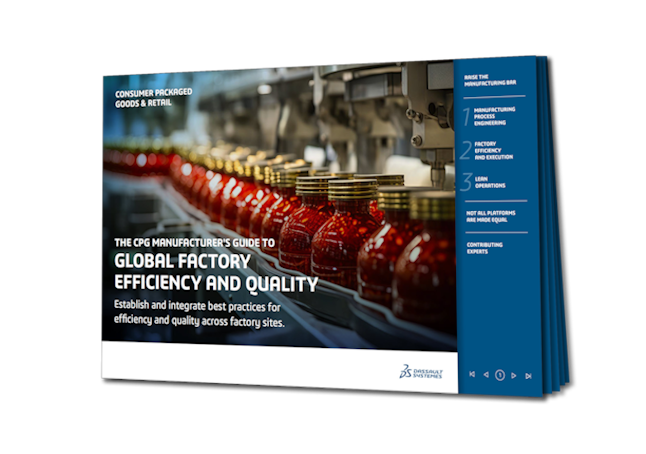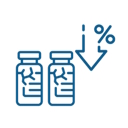Food & Beverage Manufacturing Excellence for Any Product, Any Plant
Achieve unmatched visibility, synchronization and control of global food & beverage production.
Manufacturers in the Food & Beverage Industry Are Challenged to Drive Efficient Production
Whether you’re manufacturing food or beverages – or both – it’s never been more critical to manage the complex production of your portfolio of products with precision and quality. Consumers want more functional foods, natural and sustainable ingredients, a wider range of options and product safety. This means more innovation from food and beverage processing manufacturers – which can translate into more products in smaller batches with shorter lead times – putting increased strain on factories to increase productivity and overall equipment effectiveness (OEE) without sacrificing quality.
Dassault Systèmes Offers the Perfect Production Software Solution for the Food & Beverage Industry
Perfect Production provides food & beverage manufacturers with an agile solution to build the virtual twin of manufacturing processes and experience the next level of operational performance with improved visibility, control and synchronization of global production. Click here to learn about our manufacturing solutions on the cloud.
Key Business Benefits for a Food & Beverage Sector Manufacturer
INCREASE
OEE% across plants
LOWER
Customer quality claims by 50-90%
REDUCE
Defective products by 50-90%
ACCELERATE
New product introduction (NPI) rate
Dassault Systèmes’ solutions are trusted by leading global food & beverage companies:









Optimize Factories, Equipment and Workforce in Food & Beverage Manufacturing
- 1. Manufacturing Process Engineering
- 2. Factory Efficiency and Execution
- 3. Lean Operations
Manufacturing Process Engineering
The highly proliferated product portfolios of food & beverage industry manufacturers stretch across extensive manufacturing networks. For optimal manufacturing process engineering, you must:
- Define the product to be manufactured for consumers
- Determine the food or beverage manufacturing process
- Provide direction for the workforce
With Dassault Systèmes' manufacturing solutions available from the 3DEXPERIENCE® platform, you can leverage a 3D environment for the following wide range of capabilities :
- Define a plant-specific MBOM
- Generate accurate manufacturing plans
- Provide work instructions in 3D
- Design for manufacturing sustainability
Factory Efficiency and Execution
Food and beverage sector manufacturers need to manage everything within the four walls of factory sites, not just what's happening on the production line. A comprehensive and core system is required for manufacturing excellence.
Collaboration on a digital platform will unify operational intelligence. This delivers visibility into, control over and synchronization across all operations on the factory floor. Dassault Systèmes' Manufacturing Operation Management (MOM) solution enables production, maintenance and quality execution to be incorporated into a single, automated workflow that can respond quickly to disruptions. The solution includes key capabilities for the food and beverage industry:
- Production execution
- Quality and compliance management
- Maintenance execution
- Line supply fulfillment Warehouse management
Lean Operations
Paper-based lean operational management no longer fits today's complex manufacturing planning needs. Continued reliance on paper, sticky notes and pens to run shift meetings may not address some of the key challenges of lean operations. For optimal lean operational management in modern factories, you must:
- Eliminate paper
- Empower your team
- Create digital continuity
The operators of tomorrow want modern solutions; they are used to touch screens and they want to help improve performance using technology. Dassault Systèmes' future-forward 3DLean solution helps you effectively transition from paper to digital and offers powerful capabilities, including:
- Digitizing lean operations on the shop floor
- Delivering full empowerment to the team Creating digital continuity
EBook: The CPG Manufacturer's Guide to GLOBAL FACTORY EFFICIENCY AND QUALITY
Establish and integrate best practices for efficiency and quality across factory sites.

Frequently Asked Questions
The food and beverage manufacturing industry encompasses businesses and organizations that produce, manage, regulate, and distribute food and beverages.
This industry includes a wide range of activities, from processing meats and cheeses to creating soft drinks, alcoholic beverages, packaged foods, and other modified foods.
Examples of food and beverage production include transforming raw ingredients into products like beer, dairy products (cheese, yogurt, ice cream), baked goods, soft drinks, and processed meats.
Food manufacturing refers to transforming raw ingredients into edible products. Companies in the food manufacturing industry produce a wide range of packaged consumer foods. For example, General Mills uses raw materials like wheat, oat, and sugar to make cereals, desserts, and pet food.
The non-alcoholic category is comprised of soft drink syrup manufacture; soft drink and water bottling and canning; fruit juices bottling, canning and boxing; the coffee industry and the tea industry. Alcoholic beverage categories include distilled spirits, wine and brewing.
Batch production, or batch manufacturing, is one of the main types of manufacturing. It means that the product is made in batches, with every item in the batch going through a series of steps at the same time and in the same order, until the entire batch is complete.
Batch production is usually used for smaller product runs, or to make products with certain changes and customizations that will be the same for each item within the batch. It’s a way of ensuring standard quality, while also enabling customization and variety between batches.
The biggest food and beverage (F&B) manufacturers globally, by revenue, include Nestlé, PepsiCo, Coca-Cola, JBS, and Anheuser-Busch InBev.
The use of automation in food and beverage manufacturing processes has many benefits. Automated systems can reduce the risk of human error and contamination, ensuring food safety standards are met. They also enable manufacturers to maintain consistency in production quality, minimize waste, and improve efficiency.
Ready to accelerate your production efficiency journey?
Explore our Industry Solution Experiences
Learn more about how our Industry Solutions can help you achieve your manufacturing ambitions and business objectives




